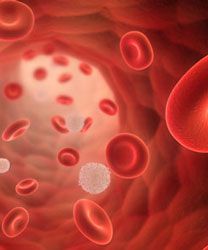FDA Grants Romyelocel-L RMAT Designation for Prevention of Infections in AML Patients With Neutropenia
Romyelocel-L (human myeloid progenitor cells) has been granted a Regenerative Medicine Advanced Therapy designation by the FDA for the prevention of bacterial and fungal infections in patients with acute myeloid leukemia undergoing induction chemotherapy, according to Cellerant Therapeutics, Inc, the manufacturer of the therapy. RMAT designation holds similar advantages to breakthrough therapy designation.
blood cells

Romyelocel-L (human myeloid progenitor cells) has been granted a Regenerative Medicine Advanced Therapy (RMAT) designation by the FDA for the prevention of bacterial and fungal infections in patients with acute myeloid leukemia (AML) undergoing induction chemotherapy, according to Cellerant Therapeutics, Inc, the manufacturer of the therapy. RMAT designation holds similar advantages to breakthrough therapy designation.
Romyelocel-L is an off-the-shelf cell therapy which does not require HLA matching. Neutropenia is a major side effect of myelosuppressive chemotherapy such as induction chemotherapy that puts patients at risk for developing serious infections.
The RMAT designation is based on results from a phase II clinical trial in which romyelocel-L reduced the incidence of serious infection by 76% in patients with newly diagnosed AML undergoing induction chemotherapy. Treatment with romyelocel-L also reduced the total number of days patients spent in the hospital by 3.2 days, and reduced the use of antimicrobial drugs by 29%. These findings were presented in a poster at the 2018 ASCO Annual Meeting. Cellerant now plans to move forward with a pivotal phase III clinical study of romyelocel-L.
RMAT designation is granted to regenerative medicine therapies that are intended to treat a serious or life-threatening condition and could address unmet medical needs for such condition. The designation will now allow Cellerant to have early interactions with the FDA to discuss potential ways to accelerate the regulatory approval of this therapy.
“Receiving RMAT designation for romyelocel-L is an important milestone and recognition by the FDA of the potential of romyelocel-L to serve this unmet medical need,” Ram Mandalam, president and CEO of Cellerant Therapeutics, Inc, said in a statement. “We look forward to working with the FDA to advance development of romyelocel-L.”
In the phase II randomized, controlled trial, 163 patients with newly diagnosed AML were randomized 1:1 to receive either romyelocel-L plus granulocyte colony-stimulating factor (GCSF) or GCSF alone. Patients were over 55 years old and had received either prior cytarabine and an anthracycline or high-dose cytarabine induction chemotherapy (HIDAC).
Patients in the experimental arm received CLT-008 9 days after beginning chemotherapy. Both groups received G-CSF 14 days after beginning chemotherapy.
From day 15 to day 28, efficacy was analyzed in the 120 patients deemed evaluable for analysis. The experimental arm experienced a 76% decrease in incidence of serious infection compared to the control arm (P = 0.001), while the average total days in the hospital was 3.2 days less than the control group (P=0.001).
There was also a 29% reduction in number of patients treated for a diagnosed infection (P = 0.028). There was a 32% decrease in microbiologically defined bacterial or fungal infections the experimental arm versus the control arm, while findings also showed there was no infection deaths in the experimental arm versus 2 in the control arm.
Overall, there were no safety concerns found with romyelocel-L and incidence of serious adverse events were similar between both arms.